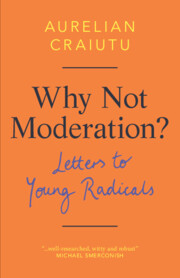Book contents
- WHY NOT MODERATION?
- Why Not Moderation?
- Copyright page
- Dedication
- Contents
- Caveat lector!
- About This Book
- Prologue Why Radical Moderation?
- PART I THE WORLD WE LIVE IN
- PART II WHAT KIND OF VIRTUE IS MODERATION?
- PART III DO MODERATES HAVE A POLITICAL VISION?
- Interlude
- 1 The Limits of Moral Clarity
- 2 Against the Politics of Warfare
- 3 No Manichaeism and No Litmus Tests
- 4 Compromise
- 5 Trimming and Balance
- 6 Centrism
- 7 Eclecticism and Pluralism
- 8 Dialogue
- PART IV THE ETHOS OF MODERATION
- PART V WHO NEEDS MODERATION TODAY?
- Acknowledgments
- Notes
- Index
8 - Dialogue
from PART III - DO MODERATES HAVE A POLITICAL VISION?
Published online by Cambridge University Press: 12 October 2023
- WHY NOT MODERATION?
- Why Not Moderation?
- Copyright page
- Dedication
- Contents
- Caveat lector!
- About This Book
- Prologue Why Radical Moderation?
- PART I THE WORLD WE LIVE IN
- PART II WHAT KIND OF VIRTUE IS MODERATION?
- PART III DO MODERATES HAVE A POLITICAL VISION?
- Interlude
- 1 The Limits of Moral Clarity
- 2 Against the Politics of Warfare
- 3 No Manichaeism and No Litmus Tests
- 4 Compromise
- 5 Trimming and Balance
- 6 Centrism
- 7 Eclecticism and Pluralism
- 8 Dialogue
- PART IV THE ETHOS OF MODERATION
- PART V WHO NEEDS MODERATION TODAY?
- Acknowledgments
- Notes
- Index
Summary
This chapter highlights the strong relationship between dialogue and political moderation by drawing on the ideas of J. S. Mill’s On Liberty (1859). It makes a plea for cultivating the civil art of disagreement that is vital to our free and democratic way of life.
Keywords
- Type
- Chapter
- Information
- Why Not Moderation?Letters to Young Radicals, pp. 135 - 142Publisher: Cambridge University PressPrint publication year: 2023

